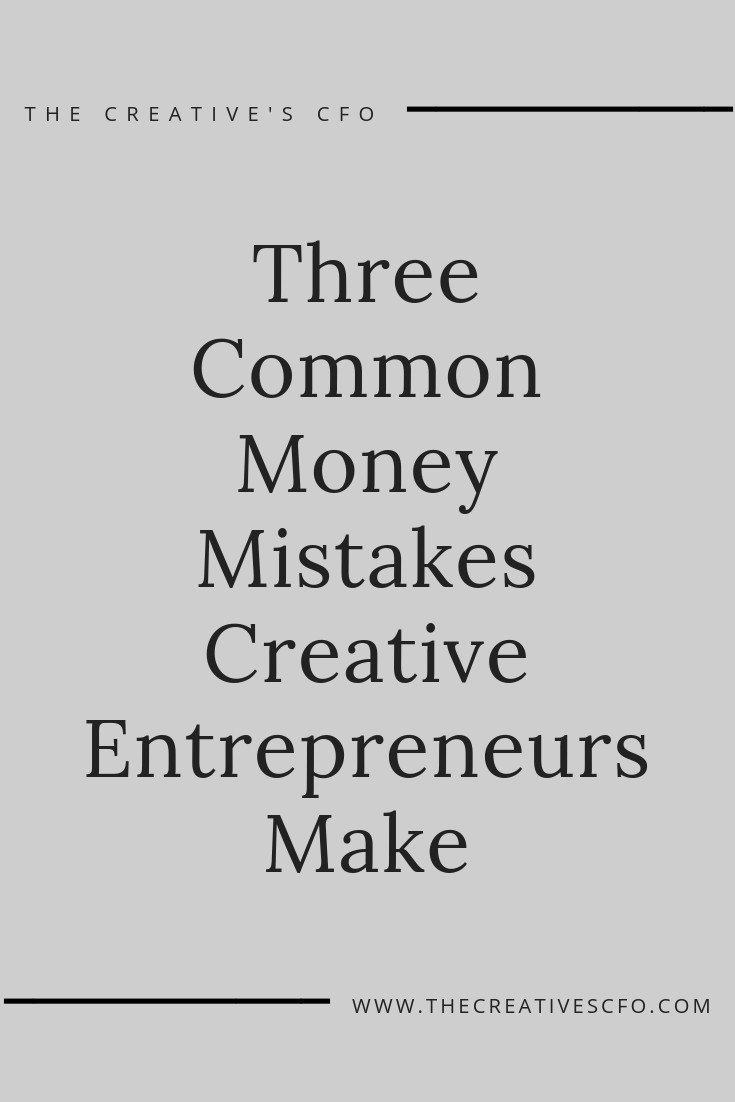How often have you let the fear of making a money mistake keep you from really getting to know your numbers?
Managing your finances doesn’t have to be confusing or scary, and making a money mistake shouldn’t be devastating. I ’d like to share with you a few common mistakes I see creative entrepreneurs making with their money. Let me help you fix these mistakes sooner rather than later, or avoid them altogether.
MONEY MISTAKE #1: MIXING BUSINESS AND PERSONAL EXPENSES
The first piece of advice I give to all creative entrepreneurs is to use separate checking accounts for business and personal transactions. It saves so much time when you don’t have to sift through hundreds of transactions to find the handful that apply to your business. Plus, it ensures that you have a record of every single business transaction so that you don’t miss out on valuable tax deductions.
Having separate accounts also ensures personal privacy. Imagine handing your account statements off to your accountant and having him or her sift through your personal transactions for business deductions. It might take hours (and a hefty invoice!).
Another factor in keeping business and personal expenses separate is liability. If you’re a registered business entity (such as LLC, partnership, or corporation), maintaining a separate bank account for business protects your personal assets. One of the benefits of forming a separate legal business entity is to shield your personal assets from the business’s liabilities, so do your part in keeping them separate also. Otherwise, you might risk losing your legal shield of liability, and someone you do business with could come after your personal assets.
MONEY MISTAKE #2: NOT KNOWING WHAT IT COSTS TO RUN YOUR BUSINESS
The second mistake I see so many creatives make is not knowing what it costs to run the business. This means, on a monthly basis, how much do you spend to produce your offer and to operate your business.
I’ve seen one too many creative spend based on the cash balance in the bank instead of planning spending and using available cash flow. Spending based on the bank balance drains funds you should potentially be saving for expenses down the road. That’s why you must know what it costs to run your business. It helps you comfortably predict the amount and timing of cash outflows (expenses) against anticipated cash inflows (revenues).
If you’re wondering what it costs to run your business, I’ve created a handy worksheet to help you determine where you’re spending the money you earn.
MONEY MISTAKE #3: SKIPPING WEEKLY AND MONTHLY BOOKKEEPING
The third and final mistake you may be making in your business is skipping weekly maintenance and monthly bookkeeping for your business. Quickly categorizing the week’s transactions and scanning receipts will eliminate the scramble to do a whole year’s worth of transactions all at once. Trust me, it’s no fun. Make this a part of your weekly schedule!
Accountability partners are great for this sort of task. Hook up with your business bestie, and keep each other accountable for getting those transactions categorized weekly.
If you’ve been keeping up with weekly maintenance, running your monthly reports will be a breeze. Run a profit and loss statement for the month and for the year to date. Compare these reports against your annual income goals to see where you stand. Analyzing your business goals against your performance should be part of your regular monthly bookkeeping process, as it ensures that you stay on track to crush your goals.
When it comes to money mistakes, the most important thing to remember is that you can fix them. With a bit of guidance and support, you can make money mistakes a thing of the past. So, raise your hand if you need help. We’re all in this together!


